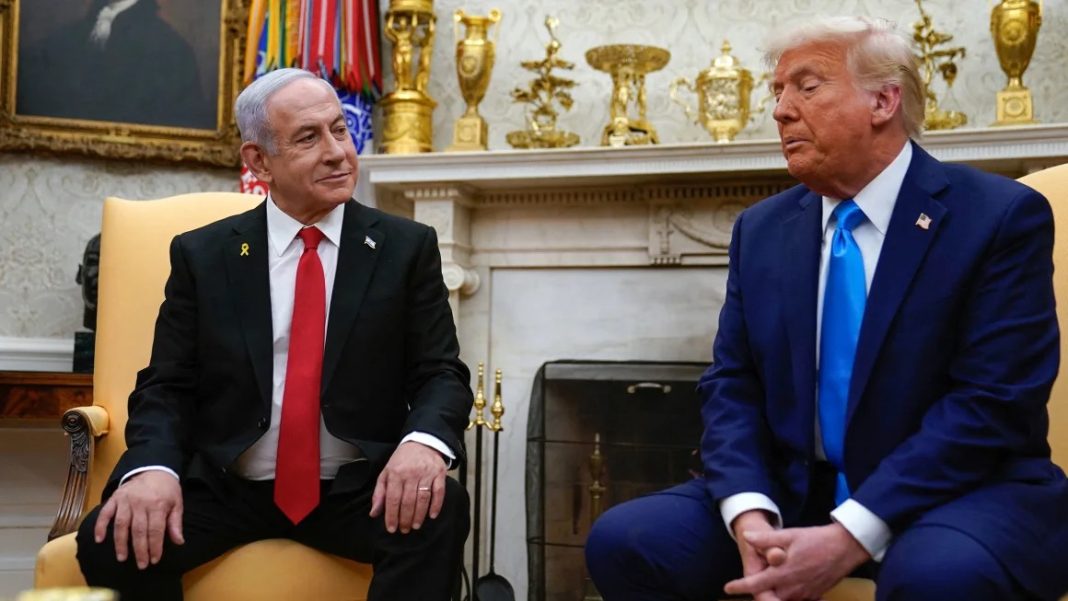JERUSALEM, Israel — Israeli Prime Minister Benjamin Netanyahu has publicly endorsed U.S. President Donald Trump’s proposal to take control of Gaza and relocate large numbers of Palestinians, a plan that has triggered international condemnation.
Trump’s proposal, unveiled during a joint press conference with Netanyahu at the White House on Tuesday, February 4, 2025, involves displacing Gaza’s population to neighbouring countries and placing the enclave under U.S. control after the fighting ends.
The plan was immediately rejected by Middle Eastern leaders, Western allies, and human rights organizations, with critics arguing that it violates international law and amounts to ethnic cleansing.

Netanyahu: ‘A Remarkable Idea’
Despite the backlash, Netanyahu defended the proposal, calling it “remarkable” and suggesting it was the first “good idea” he had heard regarding Gaza’s future.
“The actual idea of allowing first Gazans who want to leave to leave, I mean, what is wrong with that?” Netanyahu said in an interview with Fox News on Wednesday.
“This is the first good idea that I’ve heard. It’s a remarkable idea and I think it should be really pursued, examined, pursued, and done because I think it will create a different future for everyone.”
Trump doubled down on the plan on Thursday, writing on Truth Social that Gaza “would be turned over to the United States by Israel at the conclusion of fighting”, though he offered no further details on how the transition would be executed.

International Outcry and Rejection
The United Nations, European allies, and Arab nations have condemned the plan, with leaders stressing that forcibly removing Palestinians from Gaza would violate international law.
Qatar’s Foreign Ministry spokesperson, Majed Al Ansari, reaffirmed that Arab nations plan to reconstruct Gaza while keeping Palestinians in their homeland.
Jordan’s King Abdullah, whose country has long opposed forced displacement, departed for meetings in the United Kingdom and the U.S., where he is expected to raise concerns over Trump’s proposal.
The Palestinian response has been unequivocal. Gazan resident Amir Karaja told CNN on Wednesday, “This is our land, and we are the honest and true owners. I won’t be displaced. Not (Trump) nor anyone else can uproot us from Gaza.”

Israel Moves to Implement ‘Voluntary Departure’
In a sign that Israel is moving forward with elements of Trump’s proposal, Defense Minister Israel Katz has instructed the Israel Defense Forces (IDF) to develop a plan to “enable the voluntary departure” of Palestinians from Gaza.
“I welcome the bold initiative of U.S. President Trump, which could allow a large portion of Gaza’s population to relocate to various destinations worldwide,” Katz said in a statement on Thursday.
Katz further claimed that countries such as Spain, Ireland, and Norway—which have accused Israel of violating international law in Gaza—are “legally obligated” to accept Palestinian refugees.

A Break From U.S. Foreign Policy
Trump’s plan marks a radical shift in U.S. foreign policy, which has historically backed a two-state solution for Israel and Palestine.
The proposal has also exposed divisions within the U.S. government, with White House officials privately distancing themselves from Trump’s remarks.
According to sources, Trump’s Middle East envoy, Steve Witkoff, told Republican lawmakers in a closed-door meeting that elements of the plan had been under discussion for some time.
However, other officials within the administration were reportedly blindsided by Trump’s announcement.

Uncertainty Over Ceasefire Talks
The controversy comes at a delicate moment in ceasefire negotiations between Israel and Hamas.
The current ceasefire agreement, set to expire on March 1, remains uncertain as Netanyahu resists pressure to fully withdraw Israeli troops from Gaza.
Netanyahu has pledged to eliminate Hamas’ military and governing capabilities, claiming that Israel has already “decimated most of Hamas’ military power” but must ensure that the group “does not exist when this war ends.”
Despite Israel’s 15-month military campaign, which has devastated Gaza and killed tens of thousands of Palestinians, Hamas remains active.
Former U.S. Secretary of State Antony Blinken recently warned that Israeli military operations have not weakened Hamas in the long term, stating, “Hamas has recruited almost as many new militants as it has lost. That is a recipe for an enduring insurgency and perpetual war.”

A High-Stakes Moment for U.S.-Israel Relations
As global opposition to Trump’s Gaza proposal grows, diplomatic sources suggest that Netanyahu’s full endorsement of the plan could further isolate Israel from its traditional allies.
With ongoing ceasefire negotiations and rising international scrutiny, Netanyahu’s embrace of Trump’s vision sets the stage for a contentious and uncertain future for Gaza, the broader Middle East, and U.S.-Israel relations.







